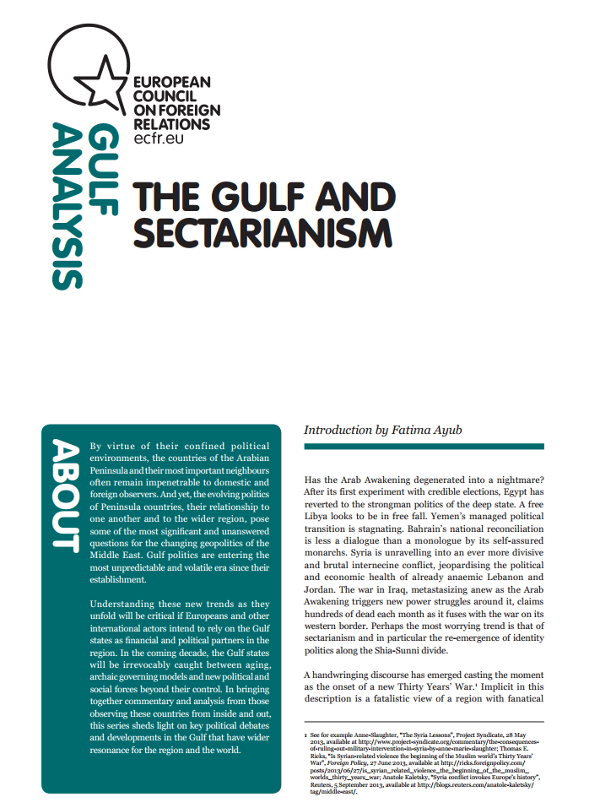The Gulf and sectarianism
How sectarian agendas shape the politics of the Middle East
At the negotiations in Geneva on Iran’s nuclear programme at the weekend, Iranian Foreign Minister Javad Zarif said that sectarianism was “the most serious security threat not only to the region but to the world at large.” A destructive legacy of the decades-long cold war between the Sunni-majority Gulf and Shia Iran since the Islamic Revolution in 1979, sectarian politics have become a defining feature of the Middle East’s many conflicts, from Lebanon to Iraq and now Syria.
ECFR’s latest issue of Gulf Analysis, edited by Fatima Ayub, explores the phenomenon of sectarianism and explains how governments in the region cultivate and manipulate sectarian agendas to pursue strategic policy goals.
“Gulf Analysis” shows that many governments in the region use sectarianism as a convenient instrument to justify discrimination against minorities. A series of essays written by insiders from the region explain how sectarian agendas are deployed and how they shape the politics of the wider Middle East:
- Saudi Arabia: No other country is accused of doing more to propagate sectarianism than Saudi Arabia. The Saudi royal family sees itself as the rightful inheritor and guardian of Islamic orthodoxy and. The kingdom promotes distinctly sectarian policies in Bahrain and Syria, where it fears growing Iranian influence. Saudi Arabia shows noinclination to address the marginalisation of its own Shia population, which is often deemed seditious by virtue of its faith.
- Iran: Perhaps surprisingly, Iran seeks to establish strategic, not sectarian, alliances. Its effort to counter its regional isolation has led it to established partnerships with actors that share its interpretation of international and regional security threats rather focusing exclusively on allies from within its branch of Islam. Examples include an alliance with Iraq as well as the close partnership with Hamas and Assad’s Syria.
- Iraq: The political, social and economic crises that unfolded in Iraq since the US-led invasion in 2003 remain unresolved and risk pushing the country into even deeper violence. Prime Minister Nouri al-Maliki’s use of sectarianism to consolidate his power is deepening divisions between the county’s majority Shia population and its Sunni minority.
- Qatar: Although Qatar has not explicitly sought to promote a sectarian agenda in its domestic or foreign policy, the attempts of its leadership to expand its influence in the Middle East and North Africa have nonetheless inflamed sectarian tensions at home and abroad. The country is seeking to chart an uneasy course between its support for Islamists abroad without alienating its own Shia citizens and restoring better relations with Iran.
“As Syria deteriorates, sectarianism will become more prevalent there and elsewhere. But taking a broader view, the historical axis between the Gulf and Western powers against Iran exacerbates regional tensions. So the Geneva meetings between the E3+3 have implications for much more than Iran’s nuclear capabilities. If there is an agreement with Iran, it could mark the beginning of a slow shift towards a more pragmatic recognition of mutual interests rather than a continuation of the destructive proxy politics we now see in Syria.” – Fatima Ayub
The European Council on Foreign Relations does not take collective positions. ECFR publications only represent the views of their individual authors.



